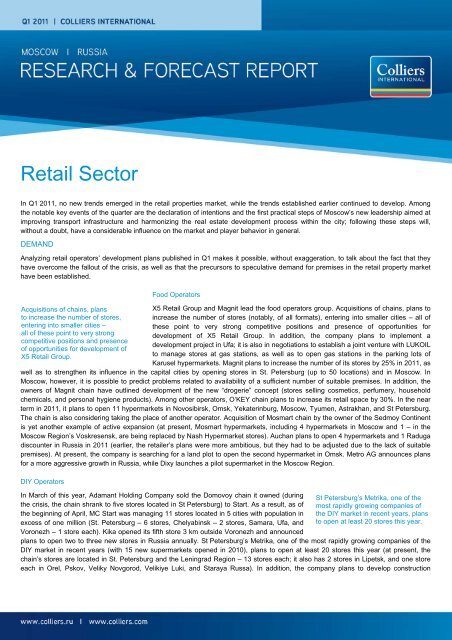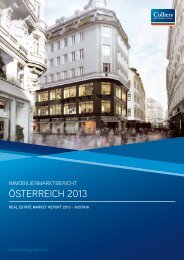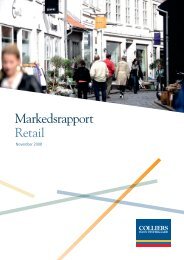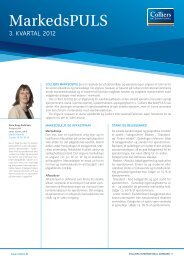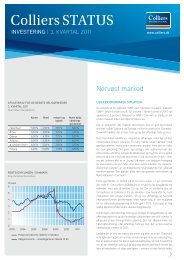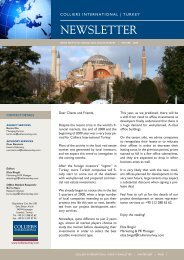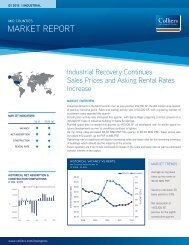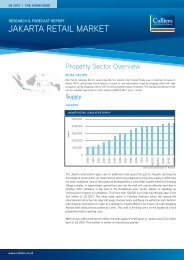Retail Sector - Colliers International
Retail Sector - Colliers International
Retail Sector - Colliers International
You also want an ePaper? Increase the reach of your titles
YUMPU automatically turns print PDFs into web optimized ePapers that Google loves.
<strong>Retail</strong> <strong>Sector</strong><br />
In Q1 2011, no new trends emerged in the retail properties market, while the trends established earlier continued to develop. Among<br />
the notable key events of the quarter are the declaration of intentions and the first practical steps of Moscow’s new leadership aimed at<br />
improving transport infrastructure and harmonizing the real estate development process within the city; following these steps will,<br />
without a doubt, have a considerable influence on the market and player behavior in general.<br />
DEMAND<br />
Analyzing retail operators’ development plans published in Q1 makes it possible, without exaggeration, to talk about the fact that they<br />
have overcome the fallout of the crisis, as well as that the precursors to speculative demand for premises in the retail property market<br />
have been established.<br />
Acquisitions of chains, plans<br />
to increase the number of stores,<br />
entering into smaller cities –<br />
all of these point to very strong<br />
competitive positions and presence<br />
of opportunities for development of<br />
X5 <strong>Retail</strong> Group.<br />
Food Operators<br />
X5 <strong>Retail</strong> Group and Magnit lead the food operators group. Acquisitions of chains, plans to<br />
increase the number of stores (notably, of all formats), entering into smaller cities – all of<br />
these point to very strong competitive positions and presence of opportunities for<br />
development of X5 <strong>Retail</strong> Group. In addition, the company plans to implement a<br />
development project in Ufa; it is also in negotiations to establish a joint venture with LUKOIL<br />
to manage stores at gas stations, as well as to open gas stations in the parking lots of<br />
Karusel hypermarkets. Magnit plans to increase the number of its stores by 25% in 2011, as<br />
well as to strengthen its influence in the capital cities by opening stores in St. Petersburg (up to 50 locations) and in Moscow. In<br />
Moscow, however, it is possible to predict problems related to availability of a sufficient number of suitable premises. In addition, the<br />
owners of Magnit chain have outlined development of the new “drogerie” concept (stores selling cosmetics, perfumery, household<br />
chemicals, and personal hygiene products). Among other operators, O’KEY chain plans to increase its retail space by 30%. In the near<br />
term in 2011, it plans to open 11 hypermarkets in Novosibirsk, Omsk, Yekaterinburg, Moscow, Tyumen, Astrakhan, and St Petersburg.<br />
The chain is also considering taking the place of another operator. Acquisition of Mosmart chain by the owner of the Sedmoy Continent<br />
is yet another example of active expansion (at present, Mosmart hypermarkets, including 4 hypermarkets in Moscow and 1 – in the<br />
Moscow Region’s Voskresensk, are being replaced by Nash Hypermarket stores). Auchan plans to open 4 hypermarkets and 1 Raduga<br />
discounter in Russia in 2011 (earlier, the retailer’s plans were more ambitious, but they had to be adjusted due to the lack of suitable<br />
premises). At present, the company is searching for a land plot to open the second hypermarket in Omsk. Metro AG announces plans<br />
for a more aggressive growth in Russia, while Dixy launches a pilot supermarket in the Moscow Region.<br />
DIY Operators<br />
In March of this year, Adamant Holding Company sold the Domovoy chain it owned (during<br />
the crisis, the chain shrank to five stores located in St Petersburg) to Start. As a result, as of<br />
the beginning of April, MC Start was managing 11 stores located in 5 cities with population in<br />
excess of one million (St. Petersburg – 6 stores, Chelyabinsk – 2 stores, Samara, Ufa, and<br />
Voronezh – 1 store each). Kika opened its fifth store 3 km outside Voronezh and announced<br />
St Petersburg’s Metrika, one of the<br />
most rapidly growing companies of<br />
the DIY market in recent years, plans<br />
to open at least 20 stores this year.<br />
plans to open two to three new stores in Russia annually. St Petersburg’s Metrika, one of the most rapidly growing companies of the<br />
DIY market in recent years (with 15 new supermarkets opened in 2010), plans to open at least 20 stores this year (at present, the<br />
chain’s stores are located in St. Petersburg and the Leningrad Region – 13 stores each; it also has 2 stores in Lipetsk, and one store<br />
each in Orel, Pskov, Veliky Novgorod, Velikiye Luki, and Staraya Russa). In addition, the company plans to develop construction
supermarkets not just in large cities, but also in towns with a population of at least 50 thousand people. Maxidom (the first DIY operator<br />
in Russia; opening of its first store took place in St. Petersburg in October 1997) is entering Moscow’s market of construction and<br />
finishing materials.<br />
Entertainment<br />
Entertainment operators are also seeing a certain revival. National cinema chains have<br />
resumed development, while regional operators have become more active. For example, KINO<br />
CITY, having started its development in St. Petersburg in 2002, entered the Moscow market at<br />
the end of 2007, and in the last two years has been designing and building properties in<br />
Orenburg, Novosibirsk, St Petersburg, and Maykop. VERY VELLY, a Perm chain (currently<br />
including three multiplex cinemas, two of which are located in Perm and one in Izhevsk), and<br />
Charly, a Rostov chain (consisting of two multiplex cinemas) are also planning development.<br />
Happylon, a chain of entertainment parks, which started its development in 2006 under the<br />
Babylon brand in Kazakhstan, opened its first entertainment center in Moscow in 2009. The<br />
second project of the chain was opened in VEGAS shopping and entertainment center; while at the end of April, opening of an<br />
entertainment center in Galeria shopping and entertainment center in St. Petersburg is planned. At the same time, the company<br />
continues to search for premises for its parks. KidZania, a Mexican chain of family entertainment centers, has found a partner for<br />
development in Russia using the franchising concept. The Corporation for the Development of Territories (KRT) has presented its new<br />
project, The Worlds of Captain N, to the market, and is planning to establish a chain of entertainment centers, N-Terra, in 33 cities in<br />
Russia and non-CIS countries.<br />
Shopping gallery operators are also active: foreign companies are making decisions regarding independent entry into the market and<br />
signing partnership agreements with strong local players regarding development using the franchise model; active development of the<br />
existing chains is planned.<br />
Fashion <strong>Retail</strong>ers<br />
Hermes is entering the market independently (prior to May 1, 2011, JamilCo was developing them under a franchise agreement). Prada<br />
also plans to start operating independently at the end of this year. Coach, Coty, and Desigual are planning to join them in the near<br />
future. Guess?, an American apparel manufacturer, having taking distribution in Russia in its own hands, is planning to expand its chain<br />
of stores (previously, JamilCo was developing the chain): during the spring and summer of 2011, opening of 10 new stores in Moscow,<br />
St. Petersburg, Rostov-on-Don, Yekaterinburg, and Tatarstan is planned.<br />
Moneks Trading has obtained the right to develop one of the most well-know lingerie brands, Victoria’s Secret, in Russia. JamilCo plans<br />
to open first Jaeger (one of the British luxury fashions’ manufacturing and design leaders) stores in Russia in Q2 2011 at Vremena<br />
Goda and Metropolis shopping centers. Jimmy Choo, a British fashion house, has signed a franchise agreement to open its stores in<br />
Russia. According to the company’s announcement, the first boutique with an area of 50–60 sqm will open in Stoleshnikov Pereulok,<br />
Moscow, in September 2011. Opening of the first Banana Republic store is planned for September at Afimall City shopping center.<br />
Other retail operators announcing large-scale development plans include Monro, a Siberian footwear chain, which plans to expand the<br />
chain by 40–60 stores; Gloria Jeans, which has announced expanding store trading floors and closing small stores; and Obuv Rossii,<br />
with plans to open 50 stores in 2011. Mango, a Spanish operator, will launch 25–30 own and franchise stores in Russia (Irkutsk, Kazan,<br />
Moscow, Novy Urengoy, Orenburg, St. Petersburg, Stavropol, Stary Oskol, and Yuzhno-Sakhalinsk). Bosco di Ciliegi plans to open<br />
31 Bosco Sport stores of sports fashions in Russia in 2011 (in 2010, 28 stores were opened in Russia), expanding its presence by<br />
approximately 10 cities.<br />
Douglas Holding, a German company, has sold its Douglas Rivoli chain to competitors, the owners of Rive Gauche chain.<br />
The acquisition will not allow Rive Gauche to surpass its largest competitor, L’Etoile chain, in terms of the number of stores;<br />
nevertheless, it will expand its geography and strengthen its presence in Moscow and a number of cities in the regions.<br />
Public Catering Operators<br />
Foreign companies are making<br />
decisions regarding independent<br />
entry into the market and signing<br />
partnership agreements with<br />
strong local players regarding<br />
development using the franchise<br />
model; active development of the<br />
existing chains is planned.<br />
The public catering operators’ segment did not stand back, either. Having opened the first coffee shop in Moscow in 2010, the famous<br />
Dunkin’ Donuts chain, considering Russia to be one of the largest and most promising European markets, plans to increase the number<br />
of coffee shops to 20 in the very near future, and to 100 – in the long term. Other foreign chains – Chili’s, which operates in the same<br />
format as T.G.I. Friday’s, Burger King and its regional franchisee, Ginza Project, have already been actively expanding and plan to<br />
continue development. Traveler’s Coffee, a Siberian chain, opened the doors of its first coffee shop in Moscow at the end of April.<br />
In addition, several international operators are considering the possibility of entering the Russian market, including Wendy’s/Arby’s<br />
Group, an American fast food operator, which plans to open 180 fast food restaurants in Russia in the next 10 years.
SUPPLY<br />
Unlike most retail operators, expansion of supply of retail space in all formats will be<br />
lagging behind the demand for them for quite some time still.<br />
In Q1 2011, the retail property market of Moscow saw addition of two shopping centers,<br />
Afimall City (MIBC Moscow City, site No. 8, GBA – 179,000 sqm, GLA – 101,000 sqm)<br />
and TPU Planernaya (transportation terminal near Planernaya metro station, GBA –<br />
50,400 sqm, GLA – 14,800 sqm). As of the end of Q1 2011, the GBA of retail properties<br />
opened in Moscow amounted to 6,048,400 sqm (GLA – 3,026,800 sqm).<br />
About 300,000 sqm of retail space has been announced to enter the market by the end<br />
of the year (GBA indicator; GLA is about 150,000 sqm); at the same time, most of them<br />
have already been leased under preliminary agreements. This is why their opening, as<br />
well as the new projects, numbering in single digits, will hardly be able to satisfy all of<br />
the expected demand. This situation is characteristic of most Russia’s cities.<br />
VACANCY AND RENTAL RATES<br />
The situation described above leads to a reduction in vacancy rates (for many<br />
properties, they have reached the pre-crisis levels). According to our projections, growth<br />
of rental rates, denominated in USD, may amount to 10–20% in 2011 (the latter value<br />
may be achievable for some properties highly sought after by operators).<br />
STREET RETAIL<br />
The situation in the street retail property segment is similar to the one that could be<br />
observed at shopping centers. Taking into account the extremely limited new supply<br />
and higher activity of retail operators, a heated competition for premises can be<br />
expected. Even now, rental rate increases can be observed; at the same time, they<br />
happen both in the main retail streets and in the periphery districts of the capital. Also,<br />
the rates for the most attractive locations have reached the pre-crisis levels. On<br />
Tverskaya Ulitsa, Moscow’s main retail street, the current rates are USD 8,000–9,000<br />
per sqm per year (given that as recently as in the middle of 2010 asking rates there did<br />
not exceed $5,000/sqm/year).<br />
TRENDS AND FORECASTS<br />
• Active increase in demand for premises on the part of all retail profiles<br />
• Unfreezing of previously suspended projects<br />
• Higher development activity, especially in the regional cities<br />
• Increasing imbalance between demand and supply<br />
• Reduction of vacancy rates<br />
• Growth of rental rates<br />
Galina Maliborskaya<br />
Director,<br />
<strong>Retail</strong> Property Department<br />
galina.maliborskaya@colliers.com


